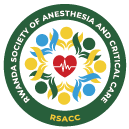Terms of Reference (ToR)
Organizing Committee
6th Rwanda Anesthesia and Critical Care Conference
October 1–10, 2025 | Kigali, Rwanda
Introduction
The 6th Annual Rwanda Anesthesia and Critical Care (RSACC) Conference will convene national and international experts to discuss strategic developments and innovations in anesthesia, critical care, and emergency medicine. This year’s conference aligns with national health priorities, including Rwanda’s NSOAP 2025–2029 and the advancement of Essential Emergency and Critical Care (EECC) services.
The conference will feature three specialized subcommittees (SubCos) to drive focused discussions, capacity building, and policy dialogue.
Organizing Committee
Led by the Deputy Legal Representative and Vice Chairperson of RSACC, Dr. Mukwesi Christian, supported by the Executive Committee and ad hoc appointed members.
General Terms of Reference
The Organizing Committee will be responsible for:
- Planning and Coordination
- Content Development
- Partnership and Sponsorship
- Promotion and Outreach
- Execution and Evaluation
- Develop a comprehensive agenda aligned with the conference’s overarching theme.
- Coordinate SubCo activities to ensure integration and thematic coherence.
- Manage logistical and operational arrangements for all events, including pre-conference workshops.
- Curate, review, and approve session proposals and abstracts.
- Work with SubCo leaders to develop specialized session content and identify local and international speakers.
- Engage stakeholders, sponsors, and partner organizations.
- Secure funding and in-kind support for conference activities.
- Design a marketing and communications strategy to attract a multidisciplinary, regional, and international audience.
- Leverage traditional, digital, and academic networks for outreach.
- Oversee the seamless delivery of the conference and pre-conference activities.
- Conduct post-event evaluations and document lessons learned.
Subcommittee 1: Anesthesia Toward NSOAP 2025–2029
Led by Dr. Francoise Nizeyimana | Assisted by Dr. Aderonke Adesiyan
Objective:
Advance national anesthesia services and contribute to the NSOAP 2025–2029 implementation through specialized tracks.
Key Focus Areas:
- Safe Perioperative (including Enhanced Recovery After Surgery — ERAS)
- Pediatric Anesthesia
- Obstetric Anesthesia
- Local, Regional, and Zero Pain Anesthesia
- Cardiac Anesthesia
- Others (as identified in pre-conference planning)
Responsibilities:
- Identify speakers and facilitators for each focus area.
- Develop workshops and simulation-based training.
- Collaborate with WFSA, ALR, and other partners.
- Coordinate outcome measurement for clinical practice changes.
Subcommittee 2: Critical Care Toward a National Strategic Plan
Led by Dr. Mukwesi Christian | Assisted by Prof. Tobi Kingsley
Objective:
Define the national vision for Critical Care development and support integrated emergency and critical care services.
Key Focus Areas:
- Pre-Hospital Emergency (Ambulance services)
- Emergency and Critical Care Units
- Essential Emergency Critical Care (EECC)
- Intensive and Critical Care Practices
Responsibilities:
- Organize case-based, interactive, and guideline-driven sessions.
- Foster interdisciplinary discussions.
- Encourage operational research in critical care delivery.
- Initiate a national consultative forum for the Critical Care strategic plan.
Subcommittee 3: Pre-Conference Activities and Cross-Cutting Themes
Led by Dr Jackson Kwizera / assisted by Professor Membeu Sulatani.
Objective:
Coordinate workshops and sessions focusing on clinical skills, education, research, and wellbeing.
Key Focus Areas:
- SAFE Obstetric Anesthesia (WFSA)
- SAFE Pediatric Anesthesia (WFSA)
- ALR EvoluBloc (Regional Anesthesia)
- FCCS+ (Fundamental Critical Care Support)
- VAST Wellbeing Program
- WHO Basic Emergency Care (BEC)
- BLS, ACLS, ATLS Provider and Instructor Courses
- Airway Masterclass
Responsibilities:
- Coordinate workshop logistics, faculty, and participant registration.
- Ensure alignment of cross-cutting themes within main conference sessions.
- Collect data on workshop participation and feedback for future planning.
Conference Monitoring & Evaluation
- Develop a monitoring framework for pre-, intra-, and post-conference activities.
- Use standardized participant feedback tools.
- Assess impact on knowledge acquisition, skills development, and intended clinical practice changes.
- Document and disseminate proceedings.









